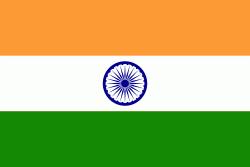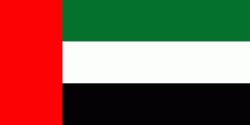Hindi
Hindi (Devanāgarī: हिन्दी or हिंदी, Hindī), or more precisely Modern Standard Hindi (Devanagari: मानक हिन्दी Mānak Hindī), is an Indo-Aryan language spoken chiefly in the Hindi Belt region encompassing parts of northern, central, eastern, and western India. Hindi has been described as a standardised and Sanskritised register of the Hindustani language, which itself is based primarily on the Khariboli dialect of Delhi and neighbouring areas of North India. Hindi, written in the Devanagari script, is one of the two official languages of the Government of India, along with English. It is an official language in nine states and three union territories and an additional official language in three other states. Hindi is also one of the 22 scheduled languages of the Republic of India.
Hindi is the lingua franca of the Hindi Belt. It is also spoken, to a lesser extent, in other parts of India (usually in a simplified or pidginised variety such as Bazaar (pronounced as "bajaar") Hindustani or Haflong Hindi). Outside India, several other languages are recognised officially as "Hindi" but do not refer to the Standard Hindi language described here and instead descend from other dialects, such as Awadhi and Bhojpuri. Such languages include Fiji Hindi, which has an official status in Fiji, and Caribbean Hindustani, which is spoken in Trinidad and Tobago, Guyana, and Suriname. Apart from the script and formal vocabulary, standard Hindi is mutually intelligible with standard Urdu, another recognised register of Hindustani as both share a common colloquial base.
Hindi is the fourth most-spoken first language in the world, after Mandarin, Spanish and English. If counted together with Urdu, it is the third most-spoken language in the world, after Mandarin and English.
The term Hindī originally was used to refer to inhabitants of the Indo-Gangetic Plain. It was borrowed from Classical Persian هندی Hindī (Iranian Persian pronunciation: Hendi), meaning "of or belonging to Hind (India)" (hence, "Indian").
Another name Hindavī (हिन्दवी) or Hinduī (हिन्दुई) (from "of or belonging to the Hindu/Indian people") was often used in the past, for example by Amir Khusrow in his poetry.
The terms "Hindi" and "Hindu" trace back to Old Persian which derived these names from the Sanskrit name Sindhu (सिन्धु), referring to the river Indus. The Greek cognates of the same terms are "Indus" (for the river) and "India" (for the land of the river).
Hindi is the lingua franca of the Hindi Belt. It is also spoken, to a lesser extent, in other parts of India (usually in a simplified or pidginised variety such as Bazaar (pronounced as "bajaar") Hindustani or Haflong Hindi). Outside India, several other languages are recognised officially as "Hindi" but do not refer to the Standard Hindi language described here and instead descend from other dialects, such as Awadhi and Bhojpuri. Such languages include Fiji Hindi, which has an official status in Fiji, and Caribbean Hindustani, which is spoken in Trinidad and Tobago, Guyana, and Suriname. Apart from the script and formal vocabulary, standard Hindi is mutually intelligible with standard Urdu, another recognised register of Hindustani as both share a common colloquial base.
Hindi is the fourth most-spoken first language in the world, after Mandarin, Spanish and English. If counted together with Urdu, it is the third most-spoken language in the world, after Mandarin and English.
The term Hindī originally was used to refer to inhabitants of the Indo-Gangetic Plain. It was borrowed from Classical Persian هندی Hindī (Iranian Persian pronunciation: Hendi), meaning "of or belonging to Hind (India)" (hence, "Indian").
Another name Hindavī (हिन्दवी) or Hinduī (हिन्दुई) (from "of or belonging to the Hindu/Indian people") was often used in the past, for example by Amir Khusrow in his poetry.
The terms "Hindi" and "Hindu" trace back to Old Persian which derived these names from the Sanskrit name Sindhu (सिन्धु), referring to the river Indus. The Greek cognates of the same terms are "Indus" (for the river) and "India" (for the land of the river).
Country
-
India
India, officially the Republic of India (Hindi: ), – "Official name: Republic of India."; – "Official name: Republic of India; Bharat Ganarajya (Hindi)"; – "Official name: Republic of India; Bharat."; – "Official name: English: Republic of India; Hindi:Bharat Ganarajya"; – "Official name: Republic of India"; – "Officially, Republic of India"; – "Official name: Republic of India"; – "India (Republic of India; Bharat Ganarajya)" is a country in South Asia. It is the seventh-largest country by area, the second-most populous country, and the most populous democracy in the world. Bounded by the Indian Ocean on the south, the Arabian Sea on the southwest, and the Bay of Bengal on the southeast, it shares land borders with Pakistan to the west; China, Nepal, and Bhutan to the north; and Bangladesh and Myanmar to the east. In the Indian Ocean, India is in the vicinity of Sri Lanka and the Maldives; its Andaman and Nicobar Islands share a maritime border with Thailand, Myanmar, and Indonesia.
Modern humans arrived on the Indian subcontinent from Africa no later than 55,000 years ago. Their long occupation, initially in varying forms of isolation as hunter-gatherers, has made the region highly diverse, second only to Africa in human genetic diversity. Settled life emerged on the subcontinent in the western margins of the Indus river basin 9,000 years ago, evolving gradually into the Indus Valley Civilisation of the third millennium BCE. By, an archaic form of Sanskrit, an Indo-European language, had diffused into India from the northwest. (a) (b) (c), "In Punjab, a dry region with grasslands watered by five rivers (hence ‘panch’ and ‘ab’) draining the western Himalayas, one prehistoric culture left no material remains, but some of its ritual texts were preserved orally over the millennia. The culture is called Aryan, and evidence in its texts indicates that it spread slowly south-east, following the course of the Yamuna and Ganga Rivers. Its elite called itself Arya (pure) and distinguished themselves sharply from others. Aryans led kin groups organized as nomadic horse-herding tribes. Their ritual texts are called Vedas, composed in Sanskrit. Vedic Sanskrit is recorded only in hymns that were part of Vedic rituals to Aryan gods. To be Aryan apparently meant to belong to the elite among pastoral tribes. Texts that record Aryan culture are not precisely datable, but they seem to begin around 1200 BCE with four collections of Vedic hymns (Rg, Sama, Yajur, and Artharva)." -
United Arab Emirates
The United Arab Emirates (UAE; اَلْإِمَارَات الْعَرَبِيَة الْمُتَحِدَة ), or simply the Emirates (الِْإمَارَات ), is a country in Western Asia (The Middle East). It is located at the eastern end of the Arabian Peninsula and shares borders with Oman and Saudi Arabia, while having maritime borders in the Persian Gulf with Qatar and Iran. Abu Dhabi is the nation's capital, while Dubai, the most populous city, is an international hub.
The United Arab Emirates is an elective monarchy formed from a federation of seven emirates, consisting of Abu Dhabi (the capital), Ajman, Dubai, Fujairah, Ras Al Khaimah, Sharjah and Umm Al Quwain. Each emirate is governed by an emir and together the emirs form the Federal Supreme Council. The members of the Federal Supreme Council elect a president and vice president from among their members. In practice, the emir of Abu Dhabi serves as president while the ruler of Dubai is vice president and also prime minister. In 2013, the country had a population of 9.2 million, of which 1.4 million were Emirati citizens and 7.8 million were expatriates. , the United Arab Emirates has an estimated population of roughly 9.9 million.
